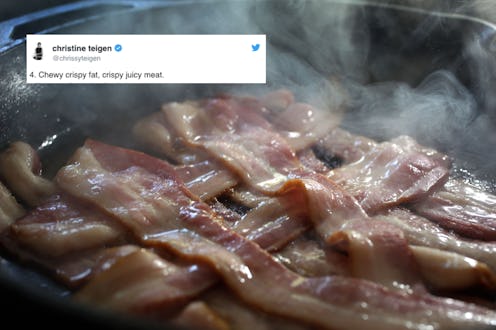Life
Turns Out It’s Possible To Make Bacon Taste Even BETTER, According To Science

In 2015, the World Health Organization announced that, in addition to smoking and asbestos, bacon and processed meats — like sausages and hot dogs — top the list of “class 1” carcinogens, according to The American Cancer Society. While it’s no surprise that processed meats aren’t exactly a health food, classifying bacon as a class 1 carcinogen is no joke. Hello Giggles reports that, in an effort to make bacon less of a health risk, scientists have devised a filtration system to make the smoking process healthier. A team of researchers at the University of Reading in the United Kingdom have been studying the effects of filtration through zeolite, and have found that filtering smoke through the porous mineral dramatically cuts dangerous carcinogens, while leaving the flavor profile intact. The study findings state that “During the traditional smoking process, in addition to the desirable smoky aroma compounds, harmful polycyclic aromatic hydrocarbons are also generated.”
The Flavour Centre research team, led by Jane T. Parker, recently presented a study at the 255th American Chemical Society National Meeting and Exposition stating that the zeolite filtration process “Reduces PAH concentrations in a smoke by up to 90 percent while maintaining a desirable smoky flavor.” While some tasters reported that the filtration process made for better tasting bacon, the main aim of Parker and team’s research efforts is to make the popular processed meat less of a health risk. Parker also stated that “At the moment there is no direct link between an increased in consumption of smoked foods and an increased incidence in cancer.” While we know that tobacco smoke contains carcinogens, the concentrations of these compounds found in foods can vary. In an effort to make the smoking process less potentially dangerous, however, Parker says “That we should be reducing the levels of these compounds in foods to levels that are as low as reasonably achievable.”
In an attempt to make bacon healthier, Parker and team turned to the zeolite filtration process — which, according to Science Alert, is commonly used in the automotive industry to filter tailpipes — to reduce the PAH (polycyclic aromatic hydrocarbons) compounds produced through the smoking process for meats such as bacon and lunch meats. Zeolite is already a popular water filtration media, and is also used as a way to cut down on environmental PAHs, like those produced from asphalt road fumes and cigarette smoke.
Zeolite is looking promising as a means to create cleaner smoke, and Parker’s research team created filters specifically for use in the meat smoking process. They found that, in addition to other compounds, they were able to remove up to 93 percent of the highly carcinogenic PAH, benzo a pyrene, which is produced when organic materials are burned at high temperatures — it’s primarily found in cigarette smoke, charbroiled foods, asphalt, coal tar, and gasoline and diesel exhaust, according to the National Center for Biotechnology Information (NCBI).
It’s also worth noting that bacon and other cured, smoked, and processed meat products are usually treated with nitrates or nitrites to preserve color and extend shelf life; studies have also linked consumption of these compounds to cancer, and the Cancer Treatment Centers of America recommend eating no more than about 16 ounces of red and processed meat per week. While there are various reasons that eating bacon isn’t the best thing for us — also not forgetting the high saturated fat and salt content, which have been linked to a higher risk of strokes and cardiovascular diseases, according to The American Heart Association — diehard bacon fans can take heart knowing that, soon, their bacon might be a little less of a health risk, and tastier to boot.